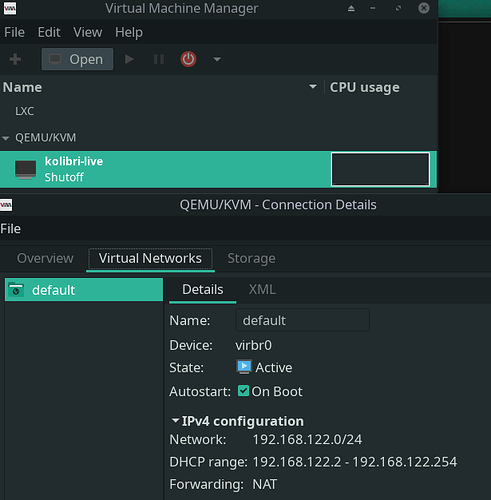Hello.
I started using Linux recently after getting myself a PC with 32 core CPU. Still a freshmen to most of this. I found that only this version of linux “Manjaro XFCE” woks with my PC! I tried others with nothing but problems and no boot issues!
I feel a bit comfortable with this distro., so I wanted to start using virtualisation (I need Windows 10 for some FEM/CFD work, and therefor I need to passthrough my GPU), and quickly found out that QEMU was the way to go, and I ended up following:
https://www.youtube.com/watch?v=KVDUs019IB8
That got me locked out of my PC.
Format, fresh system, and follow this;
https://www.youtube.com/watch?v=6KqqNsnkDlQ&t=592s
Which did not work well because the mouse was lagging when I set:
Video - to - VirtIO
The only thing that I liked is dedicating an SSD to a virtual machine!
So I wiped my system, and tryed:
https://www.youtube.com/watch?v=m4cHMIMc0Cs
Each time after I install QEMU, and after I restarted my host PC and enter the password, NOTHING happened for 5++ minutes before the desktop comes up!
I have now found this (recently ![]() ):
):
[How to] Setting up QEMU/KVM with virt-manager
[[How to] Setting up QEMU/KVM with virt-manager](https://[How to] Setting up QEMU/KVM with virt-manager)
Really tired of whiping the system ![]() I want a stable life.
I want a stable life.
To make sure that I did not do something wrong, I want to diagnose my system, or just know if it is even possible to have this done at all with this system (passthrough my GPU to the virtual machine)
Can anyone with knowledge about virtual machines help me diagnose this problem!
- 5++ minutes before the desktop comes up after logging in!
- GPU passthrough does not work
Many thanks in advance ![]()
Edit (1)
from posting
uname -r
inxi -xx
inxi -xxG
to
inxi --full --admin --filter --width
PC spec:
inxi --full --admin --filter --width
System:
Kernel: 6.6.26-1-MANJARO arch: x86_64 bits: 64 compiler: gcc v: 13.2.1
clocksource: tsc avail: hpet,acpi_pm
parameters: BOOT_IMAGE=/boot/vmlinuz-6.6-x86_64
root=UUID=c3918dd0-4642-4500-b1a8-3cae09e6e200 rw quiet splash apparmor=1
security=apparmor udev.log_priority=3
Desktop: Xfce v: 4.18.1 tk: Gtk v: 3.24.36 wm: xfwm4 v: 4.18.0
with: xfce4-panel tools: xfce4-screensaver vt: 7 dm: LightDM v: 1.32.0
Distro: Manjaro base: Arch Linux
Machine:
Type: Desktop System: ZZZ product: ZZZ v: N/A
serial: <superuser required>
Mobo: ASUSTeK model: PRIME TRX40-PRO v: Rev 1.xx
serial: <superuser required> part-nu: 12345 uuid: <superuser required>
UEFI: American Megatrends v: 1701 date: 12/13/2022
Battery:
Device-1: hidpp_battery_0 model: Logitech G604 Wireless Gaming Mouse
serial: <filter> charge: 10% (should be ignored) rechargeable: yes
status: discharging
CPU:
Info: model: AMD Ryzen Threadripper 3970X bits: 64 type: MT MCP arch: Zen 2
gen: 3 level: v3 note: check built: 2020-22 process: TSMC n7 (7nm)
family: 0x17 (23) model-id: 0x31 (49) stepping: 0 microcode: 0x830107B
Topology: cpus: 1x cores: 32 tpc: 2 threads: 64 smt: enabled cache:
L1: 2 MiB desc: d-32x32 KiB; i-32x32 KiB L2: 16 MiB desc: 32x512 KiB
L3: 128 MiB desc: 8x16 MiB
Speed (MHz): avg: 2229 high: 3700 min/max: 2200/4549 boost: enabled
scaling: driver: acpi-cpufreq governor: schedutil cores: 1: 2200 2: 2200
3: 2200 4: 2200 5: 2200 6: 2200 7: 2200 8: 2200 9: 2200 10: 2200 11: 2200
12: 2200 13: 2200 14: 2200 15: 2200 16: 2200 17: 2200 18: 2200 19: 2599
20: 2200 21: 2200 22: 2200 23: 2200 24: 2200 25: 2200 26: 2200 27: 2200
28: 2200 29: 2200 30: 2200 31: 2200 32: 2196 33: 3700 34: 2200 35: 2200
36: 2200 37: 2200 38: 2200 39: 2200 40: 2200 41: 2200 42: 2200 43: 2200
44: 2200 45: 2200 46: 2200 47: 2200 48: 2200 49: 2200 50: 2200 51: 2200
52: 2200 53: 2200 54: 2200 55: 2200 56: 2200 57: 2200 58: 2200 59: 2200
60: 2200 61: 2200 62: 2200 63: 2195 64: 2200 bogomips: 472906
Flags: avx avx2 ht lm nx pae sse sse2 sse3 sse4_1 sse4_2 sse4a ssse3 svm
Vulnerabilities:
Type: gather_data_sampling status: Not affected
Type: itlb_multihit status: Not affected
Type: l1tf status: Not affected
Type: mds status: Not affected
Type: meltdown status: Not affected
Type: mmio_stale_data status: Not affected
Type: reg_file_data_sampling status: Not affected
Type: retbleed mitigation: untrained return thunk; SMT enabled with STIBP
protection
Type: spec_rstack_overflow mitigation: Safe RET
Type: spec_store_bypass mitigation: Speculative Store Bypass disabled via
prctl
Type: spectre_v1 mitigation: usercopy/swapgs barriers and __user pointer
sanitization
Type: spectre_v2 mitigation: Retpolines; IBPB: conditional; STIBP:
always-on; RSB filling; PBRSB-eIBRS: Not affected; BHI: Not affected
Type: srbds status: Not affected
Type: tsx_async_abort status: Not affected
Graphics:
Device-1: NVIDIA TU104GL [Quadro RTX 4000] driver: nvidia v: 550.67
alternate: nouveau,nvidia_drm non-free: 550.xx+ status: current (as of
2024-04; EOL~2026-12-xx) arch: Turing code: TUxxx process: TSMC 12nm FF
built: 2018-2022 pcie: gen: 1 speed: 2.5 GT/s lanes: 16 link-max: gen: 3
speed: 8 GT/s bus-ID: 01:00.0 chip-ID: 10de:1eb1 class-ID: 0300
Display: x11 server: X.org v: 1.21.1.12 compositor: xfwm4 v: 4.18.0 driver:
X: loaded: nvidia gpu: nvidia display-ID: :0.0
note: <missing: xdpyinfo/xrandr>
Monitor-1: Unknown-1 size-res: N/A modes: 1024x768
API: EGL v: 1.5 hw: drv: nvidia platforms: device: 0 drv: nvidia device: 2
drv: swrast gbm: drv: kms_swrast surfaceless: drv: nvidia x11: drv: nvidia
inactive: wayland,device-1
API: OpenGL v: 4.6.0 compat-v: 4.5 vendor: nvidia mesa v: 550.67 glx-v: 1.4
direct-render: yes renderer: Quadro RTX 4000/PCIe/SSE2 memory: 7.81 GiB
Audio:
Device-1: NVIDIA TU104 HD Audio driver: snd_hda_intel v: kernel pcie: gen: 3
speed: 8 GT/s lanes: 16 bus-ID: 01:00.1 chip-ID: 10de:10f8 class-ID: 0403
Device-2: AMD Starship/Matisse HD Audio vendor: ASUSTeK driver: N/A
alternate: snd_hda_intel pcie: gen: 4 speed: 16 GT/s lanes: 16
bus-ID: 22:00.4 chip-ID: 1022:1487 class-ID: 0403
Device-3: ASUSTek USB Audio driver: hid-generic,snd-usb-audio,usbhid
type: USB rev: 2.0 speed: 480 Mb/s lanes: 1 mode: 2.0 bus-ID: 7-6:3
chip-ID: 0b05:1918 class-ID: 0300
API: ALSA v: k6.6.26-1-MANJARO status: kernel-api with: aoss
type: oss-emulator tools: alsactl,alsamixer,amixer
Server-1: JACK v: 1.9.22 status: off tools: N/A
Server-2: PipeWire v: 1.0.3 status: active with: 1: pipewire-pulse
status: active 2: wireplumber status: active 3: pipewire-alsa type: plugin
tools: pactl,pw-cat,pw-cli,wpctl
Network:
Device-1: Intel I211 Gigabit Network vendor: ASUSTeK driver: igb v: kernel
pcie: gen: 1 speed: 2.5 GT/s lanes: 1 port: c000 bus-ID: 44:00.0
chip-ID: 8086:1539 class-ID: 0200
IF: enp68s0 state: up speed: 1000 Mbps duplex: full mac: <filter>
Device-2: Broadcom BCM4352 802.11ac Dual Band Wireless Network Adapter
vendor: ASUSTeK PCE-AC56 Dual-Band driver: wl v: kernel modules: bcma pcie:
gen: 1 speed: 2.5 GT/s lanes: 1 bus-ID: 49:00.0 chip-ID: 14e4:43b1
class-ID: 0280
IF: wlp73s0 state: dormant mac: <filter>
IF-ID-1: virbr0 state: down mac: <filter>
IF-ID-2: virbr0SAM state: down mac: <filter>
Info: services: NetworkManager,wpa_supplicant
Bluetooth:
Device-1: ASUSTek ASUS USB-BT500 driver: btusb v: 0.8 type: USB rev: 1.1
speed: 12 Mb/s lanes: 1 mode: 1.1 bus-ID: 9-2.1:5 chip-ID: 0b05:190e
class-ID: e001 serial: <filter>
Report: rfkill ID: hci0 rfk-id: 2 state: up address: see --recommends
Drives:
Local Storage: total: 4.39 TiB used: 420.97 GiB (9.4%)
SMART Message: Required tool smartctl not installed. Check --recommends
ID-1: /dev/nvme0n1 maj-min: 259:3 vendor: Intel model: SSD
size: 1.86 TiB block-size: physical: 512 B logical: 512 B speed: 31.6 Gb/s
lanes: 4 tech: SSD serial: <filter> fw-rev: 002C temp: 36.9 C scheme: GPT
ID-2: /dev/nvme1n1 maj-min: 259:0 vendor: Samsung model: SSD
size: 1.82 TiB block-size: physical: 512 B logical: 512 B speed: 63.2 Gb/s
lanes: 4 tech: SSD serial: <filter> fw-rev: 3B2QJXD7 temp: 40.9 C
scheme: GPT
ID-3: /dev/sda maj-min: 8:0 vendor: Crucial model: CT750MX300SSD1
size: 698.64 GiB block-size: physical: 512 B logical: 512 B speed: 6.0 Gb/s
tech: SSD serial: <filter> fw-rev: R011 scheme: MBR
ID-4: /dev/sdc maj-min: 8:32 vendor: Generic model: USB3.0 CRW -SD
size: 29.81 GiB block-size: physical: 512 B logical: 512 B type: USB rev: 2.1
spd: 480 Mb/s lanes: 1 mode: 2.0 tech: N/A serial: <filter> fw-rev: 1.00
Partition:
ID-1: / raw-size: 1.82 TiB size: 1.79 TiB (98.37%) used: 420.96 GiB (23.0%)
fs: ext4 dev: /dev/nvme1n1p2 maj-min: 259:2
ID-2: /boot/efi raw-size: 300 MiB size: 299.4 MiB (99.80%)
used: 296 KiB (0.1%) fs: vfat dev: /dev/nvme1n1p1 maj-min: 259:1
Swap:
Alert: No swap data was found.
Sensors:
System Temperatures: cpu: 51.9 C mobo: N/A gpu: nvidia temp: 38 C
Fan Speeds (rpm): N/A gpu: nvidia fan: 30%
Info:
Memory: total: 128 GiB note: est. available: 125.64 GiB
used: 13.34 GiB (10.6%)
Processes: 937 Power: uptime: 23h 17m states: freeze,mem,disk suspend: deep
avail: s2idle wakeups: 1 hibernate: platform avail: shutdown, reboot,
suspend, test_resume image: 50.25 GiB services: upowerd,xfce4-power-manager
Init: systemd v: 255 default: graphical tool: systemctl
Packages: 1335 pm: dpkg pkgs: 0 pm: pacman pkgs: 1311 libs: 346
tools: pamac,yay pm: flatpak pkgs: 24 Compilers: clang: 16.0.6 gcc: 13.2.1
Shell: Bash v: 5.2.26 running-in: xfce4-terminal inxi: 3.3.34
Moderator edit: In the future, please use proper formatting: [HowTo] Post command output and file content as formatted text


